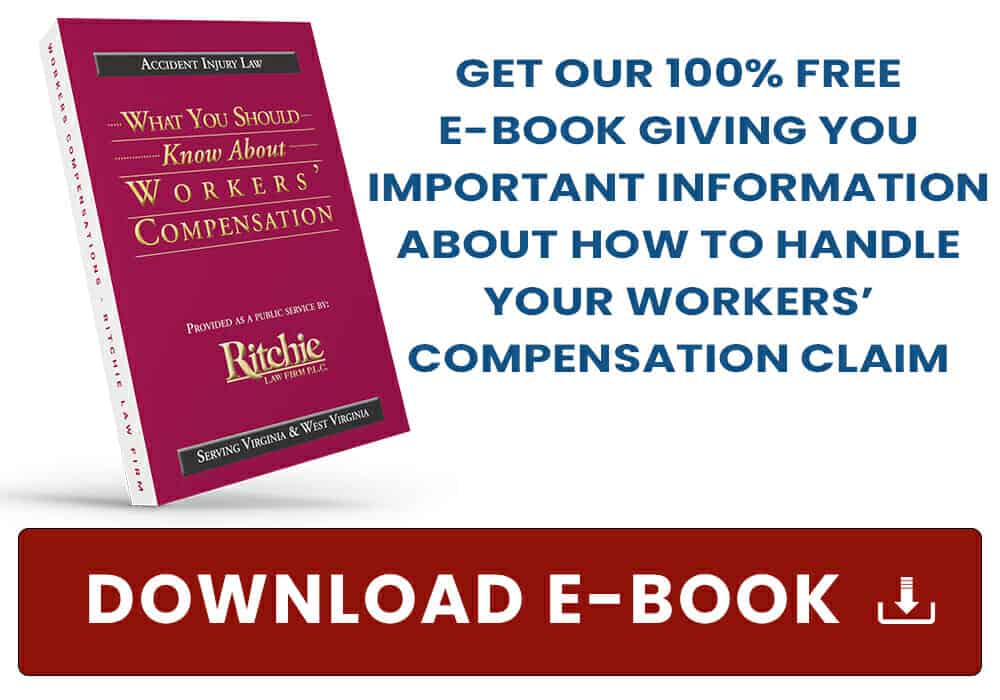Workers’ Compensation – Video Transcription
I’m Bob Guntharp. I’m an attorney with the Ritchie Law Firm. I have over 30 years of experience practicing law.
I want to talk to you today about workers’ compensation. Workers’ Compensation is a complex and rule driven area of the law. It’s covered in over 900 pages of this book. What you know or what you don’t know can hurt you. It can make the difference in whether you receive benefits or whether you’re denied benefits.
For over 45 years, the Ritchie Law Firm has been helping injured workers with their workers’ compensation claims. We’d be happy to help you. The consultation is free and we only get paid if we win.
Let’s start at the beginning. . . let’s start when somebody has had an accident. There are a variety of rules that apply in that context. How you explain things and how you understand the law in that regard can make all the difference in the world.
The first thing we talk about is something called an injury by accident. This isn’t just the ordinary meaning of that phrase. It has very specific, identifiable components. So, the first is, you have to have a specific event. You have to be able to identify a particular accident where in essence you say “Ow,” I’ve had an injury. You have to have a structural change in your body of some time. That is a very subject to argument kind of area. So, if you don’t have a broken bone, that doesn’t mean you don’t have a case. But, that’s kind of a term of art. So, you have to be careful with that.
You have to be able to establish that the structural change was the cause of the physical complaint that you are experiencing. That’s really a medical piece of evidence that needs to be supplied in the medical presentation of your case.
Cumulative Injuries – these are injuries that occur when you are just repetitively doing something. They are not covered under workers’ comp. There are two exceptions and that has to do with carpal tunnel and hearing loss. But there can be more difficult levels of proof that apply to establishing those things.
So, let’s put a little meat on the bones and try to put this in terms that are perhaps more understandable. We have 2 guys. Lets’ call them Bill and the other I’m going to call Poor Joe. They are unloading a truck. Bill is lifting boxes and carrying them onto the loading dock and so is Joe. Fifteen to twenty minutes into this job, Bill bends down to pick up a box and feels a sharp pain in his low back. He has pain radiating down his leg. He stops dead in his tracks and he hobbles out of his truck and he goes to his supervisor. Bill says “I picked up this box and I have this really bad pain in my back and I can hardly walk.” The supervisor says “You have to go to the doctor.” Maybe they drive him there. And, they send him to the ER and it turns out he has a herniated disc. Bill has to have lumbar surgery. He has to go through a lengthy recuperation and physical therapy before he can get back to the job. He’s going to be covered under workers’ comp because he had a very specific event that he reported to his supervisor. I’ll get back to the reporting in a moment.
Bill’s medical bills will all be paid. On the 8th day that he’s out of work, he’ll qualify to start receiving a check for two-thirds of his average wage as long as he is unable to work.
Now, let’s talk about Poor Joe. Remember these guys are working side by side. Well, Poor Joe, he finishes that day out. He notices he’s maybe a little bit sore but he doesn’t really necessarily feel that he had a specific event that was of enough significance that he would stop and go tell his supervisor. Well, Poor Joe goes home that evening and goes to bed. The next morning he can’t even get up he’s in so much pain. He goes to the Emergency Room. They do an MRI and low and behold Poor Joe also has a herniated disc. Poor Joe also needs surgery, physical therapy, and he is out of work for an extended period of time. Because he did not explain that he had a specific event, he is out of luck. He will not receive any workers’ compensation benefits.
Now, one thing that’s important to understand is this doesn’t have to be as severe as the example I’d given with Bill where he stops dead in his tracks. There are lots of people in Joe’s situation who complete the day out and they try to shake it off. But there may have been one moment in time when they felt a particular strain or there was something a little bit out of the ordinary and they took notice of that. That can be enough to qualify you to have had what’s called an injury by accident. If you do not have an injury by accident, and you do not explain it in that fashion, you will not qualify for workers’ compensation benefits.
Now, I also want to add an additional caution here. Don’t assume that you don’t qualify because you may not have exactly explained it right, because sometimes we can fix that. When you have a deposition taken or when there’s something called answers to interrogatories. If we have to go to hearing, sometimes we can fix that. But, you really should consult an attorney in that situation. Any time you have a workers’ comp injury, frankly of any significance, you should consult with an attorney.
There’s another component to this process. It’s called “arising out of employment.” What does that mean? Well, it means that if you are on the job and you have an accident, it doesn’t necessarily mean that you are covered. And, even if it is sort of a sudden event like I described before. It still has to arise out of employment.
What does that mean? Let me give you an example. If you’re walking down stairs at work and you stumble and fall and you break your leg, that does not necessarily arise out of employment. Because, if you were at home and you were going down the stairs and you stumbled and fell and you broke your leg, the same outcome would have occurred. You would have had a broken leg. It has to be tied in some way to employment. It doesn’t have to be an enormous connection to employment. But, you have to be associated with employment at the time. So, for example, if you’re carrying boxes in your hand as you’re going down those stairs, and maybe whatever’s in that box shifts a little bit, and that throws you off balance, and that causes you to fall down the stairs and break your leg. That arises out of employment because you have a box in your hand that’s associated with your work, with your employment. It doesn’t have to be a box, it can be other things. There could be some other event. It just has to be tied to employment, to arise out of employment. So, you’ve got to have an injury by accident. It has to arise out of employment.
There’s an additional element to all of this. It also has to happen “in the course of employment.” And, again, these are terms of art. So, “in the course of employment,” what does this mean. It means you have to be carrying on some employment activity while you’re on the job in order to qualify. If you’re driving a truck and say you’re a delivery guy. And, it’s your anniversary and you haven’t bought your wife flowers, or a gift, or a card, and you think “Hey, I’d better take care of this. I forgot about it.” And so you run into the mall to go shopping for an anniversary gift and you trip as you are hustling in there or coming out or whatever. That is kind of a personal errand that you went on. And, even though you are technically on the clock and technically at work, if you have an injury under those circumstances, you’re not going to qualify for benefits. Now, again, these are things that are sometimes subject to interpretation and argument. There are certain things such as stopping for lunch some place. You’re going to be covered if you stop for lunch and you’re going into a fast food restaurant and you trip and you fall. That is incidental to your employment because you’re entitled to have lunch and you’re out on the road. The accident has to arise “out of the course of employment.” Another example where things do not arise out of the course of employment is what they call “horseplay.” Let’s say you’re fooling around with your fellow employees, you’re kind of horsing around and someone is injured. In the course of that type of activity, it didn’t arise out of the course of employment. It’s called “horseplay” and you are out of luck.
The next thing that has to happen is you have to give notice. When you have an injury by accident, it is arising out of employment and it is in the course of employment, you must also give notice. Now, you’re supposed to give notice immediately or as soon as is practicable, because sometimes you might have a more significant injury and you may not be able to give notice right away; or, within 30 days. If you don’t do that, it doesn’t mean you’re out of luck but it makes it tougher because you have to have a reasonable reason for not having given notice. It doesn’t affect your entire claim either necessarily, but it can affect benefits going backwards from the time you ultimately did give notice to the time of the accident. So, you can lose out there. But, that is again one of those areas that you have to be careful about. And, don’t assume that if you haven’t given notice you’re not going to have a claim. Because I’ve overcome that situation many times in the past as I have with these other potential problems in cases. So, I’d be happy to talk to you. I’m sure any of the attorneys in the firm would be happy to talk to you as well. There is no charge for a consultation and we only get paid if we win. So, it’s a win-win. And, I encourage you to give us a call if you’ve had an injury on the job. Hope to hear from you soon! Take care! Bye


